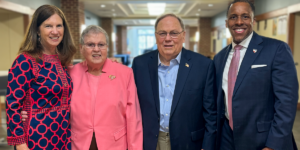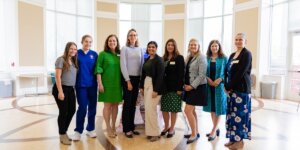They’re nearly 5,000 miles and one ocean away, but the Shenandoah University ENACTUS team is supporting a social entrepreneurship project based in the rural village of Bissiri, Burkina Faso.
This sub-Saharan African nation has the third highest rate of child mortality in the world; there are high levels of unemployment; farms are not viable because of increasingly frequent droughts; and deforestation is a huge issue.
“There isn’t enough aid to go around, and in any case, aid often perpetuates the cycle of dependency,” said Harry F. Byrd, Jr. School of Business Associate Professor Giles Jackson, Ph.D. “However, Virginia native Daniel Isner and his colleagues at Ananda Marga Universal Relief Team (AMURT) are implementing a simple, realistic and powerful solution based on social entrepreneurship principles.”
The project, ESPRI Moringa, focuses on growing drought tolerant, highly nutritious Moringa trees, which are a superfood. Ounce-for-ounce, Moringa leaves contain nine times the protein of yogurt, 10 times the Vitamin A of carrots, 17 times the calcium of milk, 25 times the iron of spinach and 15 times the potassium of bananas. The leaves are processed into powder, which is sold in capsule form to rural clinics and pharmacies at low cost for mothers to purchase and incorporate into their meals.
With 25,000 trees already planted, women’s groups and farmers associations are now being organized to produce, process and package moringa-based products for local and regional markets. In one fell swoop, the project tackles the deforestation, malnutrition and unemployment problems.
“More products are planned, including a Moringa-based bouillon cube that may be distributed across the continent,” said Dr. Jackson, who has been collaborating with Isner for five years.
The Shenandoah University ENACTUS team has already set in motion a social media blitz to promote the ESPRI Moringa fundraising campaign, hosted via the crowdfunding website, Start Some Good. They’re driving traffic to the site via personal and professional contacts in the local community and abroad. And, they’re hoping that this traffic turns into dollars for ESPRI Moringa.
“It’s an honor to be working on such an innovative and groundbreaking project,” said Dan Powers, a senior Business Administration major from Ellicott City, Md. “The opportunity to make a difference in the lives of people thousands of miles away is what drives our team to spread the word about this worthy cause. This is not a one-time project but the foundation of a scalable model that can be replicated across the sub-Saharan region.”
The fundraising goal is $9,300, with a “tipping point” of $5,500. Once the tipping point figure is met, funds will kick in and project organizers can accomplish immediate goals that include: the hiring of a full-time employee who will train rural health promoters, create and maintain relevant partnerships, and get moringa products on the market; providing a six-month guarantee for the farmers and processing workers while the product is put on the market; and producing marketing materials and securing certifications.
The additional $3,800 would provide the ability to tile and paint processing facilities, making them more hygienic and beautiful; purchase a mill to produce a better quality powder and product; and start a contingency fund to be used for additional trainings, transportation, logistics and other important action items.



